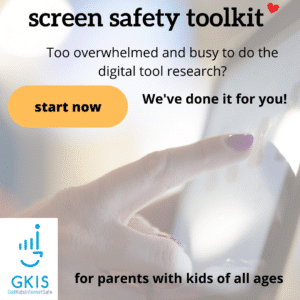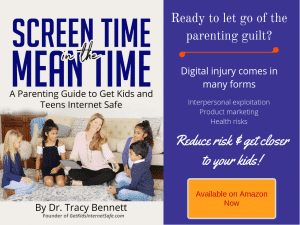
Despite recent recommendations from the American Academy of Pediatrics (AAP) to discourage media use for children younger than 2 years old, little ones are spending on average one hour a day in front of screen media, with daily use consistently increasing (American Academy of Pediatrics Council on Communications and Media Executive Committee; Common Sense Media). Does this pose a real risk, or is this discouragement along the lines of just not optimum?
Last weekend on a getaway with my husband, we saw a group of women enjoying an afternoon glass of wine while their toddlers sat strapped into strollers gazing at iPads. What initially struck me was how these women could afford the sedative effects of wine with babies so young. I remember my toddlers draining every ounce of energy I had by the afternoon. As much as I would have loved it, day drinking would have rendered me useless for mothering. Upon reflection, I perhaps should have been more concerned with the fact that developing babies were passively staring at screens instead of crawling on the grass between delighted mommies.
Don’t get me wrong, I’m not judging. If I would have had an iPad available during that stage, I’m certain I would have used it. But I’d have felt guilty about it and craved guidelines about how much was OK and why. Credible authorities like the AAP recommend no to little screen time for infants and toddlers, but the why is a harder question to get at with research still in its infancy.
As a university professor, I’m compelled to give this advice about babies and screen time: “No screen time AT ALL. The frequent synchronized dance between parent and child is key to healthy cognitive, motor, language, emotional, and social development and must not be interrupted. An infant’s brain has a critical window for learning. Mutually interactive input during this phase of development should be optimized. Furthermore, despite a large number of screen media education programs for infants and toddlers on the market, educational merit of such programs remain unproven (American Academy of Pediatrics Council on Communications and Media Executive Committee). Parents, hold off on allowing your children to view screen media until they reach preschool age. And perhaps more importantly, keep your own use at a bare minimum. Attend to your developing babies instead.”
As a mother, I’m compelled to say: “Pffft. Technology is not the enemy. YOU try to keep a little one stimulated every second of the day and tell me a break here and there isn’t warranted. Yes, no use during infancy; but how about occasional 10-minute sessions for toddlers ages 1-2 years when mom and dad are desperate to eat more than three bites at a restaurant. Lighten up and incorporate limited screen time when necessary to an already enriching day.”
******
And finally, as a psychologist I suggest moderation. Without question, frequent parent-child interaction is irreplaceable as a support to all types of healthy development. The mother’s and child’s brains are designed to be exquisitely responsive to each other for progressive learning. Hours of eye gazing and verbal and nonverbal encouragement is an intricate dance that builds mutual attachment and teaches the child about the responsiveness and safety of the world. With caregivers soothing and modeling, the child builds self-regulation skills; learning that builds brain structure and will affect him throughout his lifespan.
Furthermore, if the infant is seeking interaction, it is reasonable to believe that watching a person talk AT him without response may be confusing and even distressing to the child, perhaps contributing to attachment problems research has demonstrated with nonreactive, depressed mothers. The child should be reinforced for interactive behaviors, not ignored because the audience is an actor on a screen. We certainly don’t want a child to slow down or stop trying to elicit interaction because of a learning history with failed attempts.
On the other hand, children are resilient and typically participating in a variety of stimulating activities. Occasional, brief parent time-outs are unlikely going to result in catastrophic learning gaps. Furthermore, interactive technological like Skype and FaceTime may give the child access to attachment figures and stimulating activity of pure reciprocal joy they might otherwise have to go without. Just remember that like infants, toddlers are demanding of attention for excellent reason – they need it for healthy development! Also, parents lose time (and don’t realize it) when they get lost in the vortex of technology, so moms and dads need to keep an eye on their own screen media diet as well.
In conclusion, research has demonstrated that excessive screen time use by young children may result in developmental delay. Anecdotal evidence suggests with the explosion of new handheld devices available, more children may be getting negatively affected than ever! Furthermore, educational merit of little ones using screen media remains unproven. The less young children are in front of screens instead of interacting with the real world and real people, the better. Screen media’s inability to read and respond to infant response is a significant handicap and one could imagine how confusing, and perhaps influential, that may be to a young child. However, if parents occasionally allow use of television, phones, or tablets to entertain a child with appropriate content for a short period of time, such as Skype or FaceTime, the baby will probably not experience significant negative effect.
I suggest these sensible GKIS guidelines:
-
-
With the exception of occasional interactive media use with parent monitoring, no screen time before one year old. And once your child is 1-2 years old, limit screen exposure to short intervals with appropriate content.
This means 10 minutes a day max. 3D toys they can hold and manipulate are better, and person-to-person contact is best!
-
-
-
Choose interactive (Skype, FaceTime) rather than passive screen media whenever possible.
-
-
-
Get used to saying “no” to your child and meaning it.
Just because the baby reaches for it, doesn’t mean it’s in her best interest to have it. If you are an awesome parent, you’ll be saying “no” for the next 18 years…a lot! Get used to it.
-
-
-
Model a healthy media diet yourself.
Your energy is best spent chasing babies in and out of blanket forts than day drinking with your girlfriends. Remember that infants and toddlers are laying down extensive neurological hardware that needs quality support. As the parent, you provide the necessary scaffolding for development. Despite efforts to “erase the video deficit” (the one-way nature of screen media) by installing questions and pauses in children’s television programming, only a parent has the exquisite sensitivity to respond to a child’s ever-changing cognitive and emotional needs.If you’re feeling guilty because you’re attending too much to your screen media instead of your child, listen to that inner voice and make adjustments. Infancy flies by and critical learning windows close. You’ll miss it when it’s gone, and your child may too in the form of developmental delay. Soak in all you can before they get to school age. You’ll have plenty of time for day-drinking once they’re grown.
-
-
-
Set up conservative media guidelines from the get-go by considering how your rules may change in the future.
I see parents get into trouble, because they are too liberal while their children are young, then get resistance when they later try to scale technology use back as the children become more sophisticated in their ability to seek inappropriate material. Rather than giving a lot of rope and pulling it back in response to a crisis, instead gradually dole it out as your child develops. That means very little media time with young children. If they grow up with rules, it is less likely that they will resist it later. Imagine the gradual opening of a funnel. Start by allowing a little and increase screen access as they gain impulse control.
-
-
-
Use good judgment with screen media content as well as exposure time.
There is evidence that, just as a lack of stimulation is harmful to development, so is overstimulation with screen media. Brain research shows that screen media stimulates the pleasure center in the brain (dopamine in the nucleus accumbent) much likes drugs of addiction. While your littles are building their neurological framework, overstimulation may change brain structure. We aren’t yet sure how, but do you want your baby to be the guinea pig?
-
I hope this helps with your decision about whether to allow your 0-2 year old access to screen media. Nothing is better than making an educated decision and attending to your loving instinct. After considering the developmental variables, what is your opinion about infant/toddler use of screen media? Please pass this information on to any friends or family with young children. If you’d like some step-by-step instruction on how to get started on the right foot, check out my Connected Family Online Course. In 10 easy steps you can stage your home so your kids get the best learning enrichment from screen time while avoiding risk!
I’m the mom psychologist who will help you GetYourKidsInternetSafe.
Onward to More Awesome Parenting,
Tracy S. Bennett, Ph.D.
Mom, Clinical Psychologist, CSUCI Adjunct Faculty
GetKidsInternetSafe.com
Works Cited
“Managing Media: We Need a Plan.” American Academy of Pediatrics, 28 Oct. 2013. Web. 24 May 2014.
“Media Use by Children Younger Than 2 Years.” American Academy of Pediatrics Council on Communications and Media Executive Committee, Pediatrics, Vol. 128 No. 5, November 2011.
“Zero to Eight: Children’s Media Use in America.” Reviews & Age Ratings. Common Sense Media, 25 Oct. 2011. Web. 24 May 2014.
Photo Credits
Baby Fat Cheeks by Aikawa Ke, CC by-NC-SA 2.0
THIS TED TALK BY DR. DIMITRI CHRISTAKIS IS EXCELLENT PARENTING EDUCATION:
Don't worry, we will never spam you.










